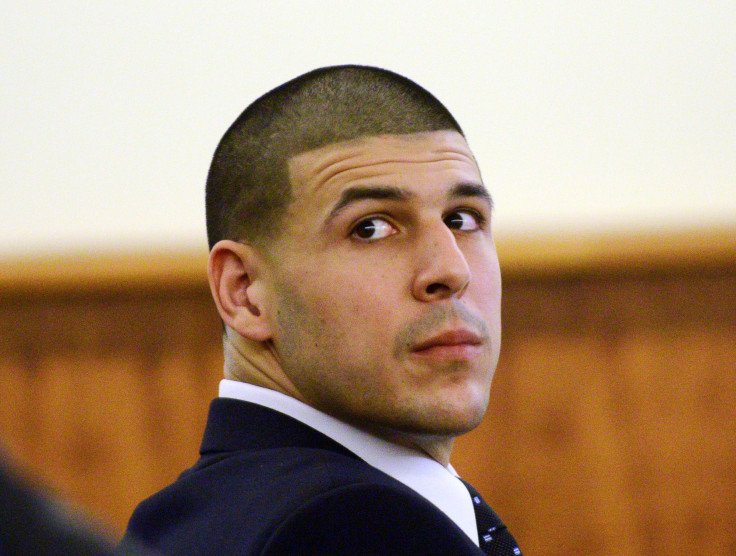Aaron Hernandez’s Brain, Blood Tests Reports Won't Be Released In Odin Lloyd Wrongful Death Suit

The analysis of Aaron Hernandez’s brain, blood and urine samples will not be released to lawyers of Odin L. Lloyd’s mother for the wrongful death lawsuit against the late ex-NFL star's estate.
The 27-year-old, who was jailed for life without parole for the 2013 murder of Lloyd, was found hanging from his prison cell window April 19 at the Souza-Baranowski Correctional Center in Shirley, Massachusetts.
New Bedford Superior Court Judge Thomas F. McGuire Jr. denied requests of preserving Hernandez's tissue and fluid samples for neuropathology and toxicology analysis to be performed. Prosecutors said the materials are “critical and irreplaceable evidence” of the cause of Hernandez’s death, the Boston Globe reported late Wednesday.
McGuire said in his ruling the analysis of Hernandez's physical remains do “not establish a factual basis for the assertion that Mr. Hernandez’s physical condition at the time of his death is relevant to the issues raised in this civil action.”
Read: Aaron Hernandez Left Bloody 'Illuminati' Symbol On Cell Wall
Appellate lawyers for Hernandez and Bristol County prosecutors are expected to attend a hearing next week where it will be decided whether the 2013 conviction against the ex-Patriots star should be abated under a Massachusetts law, which allows a conviction to be deemed void if the defendant dies with an appeal pending.
In another case, Hernandez’s lawsuit against Texas technology company Securus Technologies continues as lawyers for the late star accused the company of hacking into some of his prison phone call recordings in 2014. The hack was allegedly conducted as Hernandez was awaiting trial for Lloyd’s murder at the Suffolk House of Corrections.
Attorney George J. Leontire claimed in a new lawsuit that the company hacked into at least three of Hernandez’s recorded conversations with fiancée Shayanna Jenkins.
“Mr. Hernandez consented to being monitored by the Massachusetts Department of Corrections; Mr. Hernandez did not consent to allowing the general public to listen in on his private conversations,” Leontire wrote.
Hernandez's suicide, which came just days after he was acquitted in a double murder case, remains a mystery as the jailed NFL player left no suicide note. However, reports surfaced Hernandez wrote three letters — one to his fiancée Jenkins, another to his daughter Avielle and the last to his attorney Jose Baez.
Last week, a report claimed Hernandez used his own blood to draw "odd symbols" on his prison wall before committing suicide. The American football tight end wrote "Illuminati" in block letters on the wall along with an unfinished pyramid and the all-seeing eye of God, similar to the illustration on the back of the one dollar bill, according to Boston TV station WCVB.
While correction officers found K2 during a prison search, toxicology report for Hernandez revealed no traces of “K2,” or synthetic marijuana — or any other illegal drugs — in his system.
Meanwhile, Hernandez's family is demanding the officials who leaked information about his death be fired.
“Individuals within the government who are leaking such information are in violation of the policies and procedures of their respective agencies and should be immediately terminated,” attorney George Leontire, the family’s representative, wrote to Worcester district attorney’s office and the State Department of Correction, Boston Globe reported.
“Although most of the leaked information is false, the media credits such information because the leaks come from individuals with positions in government and law enforcement who are under your control.”
© Copyright IBTimes 2024. All rights reserved.











